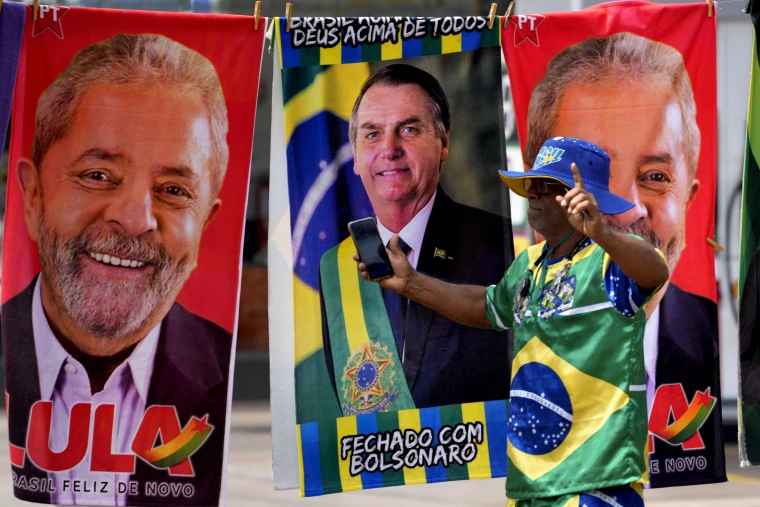The 2022 Brazilian Election: Lula vs Bolsonaro and Why the Aftermath of October 30th Matters to the World
October 20, 2022
On October 2nd, Brazilians spent their national holiday taking to the voting booths to vote in their general election. The two candidates who came up on top in the first round were Lula da Silva and Jair Bolsonaro. Because no presidential candidate exceeded 50% of the vote, they will face each other on the ballot again on October 30th. These two candidates were predicted to be the top two vote getters, but it was surprising that it was pushed into the second round according to the polls before October 2nd. Lula tallied 48.4% of the vote, while Bolsonaro raked 43.2%. These totals are much closer than the polls taken in Brazil showed as Ipec (A highly regarded pollster in Brazil) on September 26th said that Lula would have 48% of the vote while Bolsonaro would have a staggering 31% of the vote. This underestimation from the media in Brazil may come as a shock to non-Brazilians. Still, from my time asking relatives and friends in Brazil about who would win over the past year, they have always mentioned it would be a much closer election than the media would make it out to be. With the results from this past Sunday, they seem to be correct.
Bolsonaro is a part of the PL party in Brazil, the leading right-wing party in the country. He ran in 2018 as a political outsider who would crack down on corruption. He has a strong base amongst wealthy and powerful Catholics in the country. He maintains that base, but more cracks in his influence have come over his tenure due to his handling of the Covid-19 pandemic, where around 700,000 Brazilians passed away, and his continued problematic social rhetoric.
Lula was and in many ways is still beloved in Brazil due to his work as president (2003-2010), as he lifted millions out of poverty, increased economic growth in Brazil, and improved the social climate in the country. But as a leading member of the PT party, the leading left-wing party in Brazil, he was a part of a massive corruption scandal called “Operação Lava Jato” (Operation Car Wash). In this investigation, hundreds of politicians and businessmen affiliated with Petrobras (A federally owned oil company in Brazil) were investigated and indicted for accepting bribes from construction firms to launder money. Lula was sentenced to 12 years in prison in 2018 for corruption due to this investigation. Months later, Lula was annulled from his sentence due to political collusion from the prosecuting team against him.
This election’s drama intensifies with the election denial promotion from Bolsonaro. Brazilian citizens are required to vote by law on election days and are given a national holiday. They have an electronic voting system that has been used for decades and has been renowned globally for its transparency and ease of accessibility for all citizens. But recently, this system has come under scrutiny from the sitting president of Brazil, Jair Bolsonaro. Bolsonaro, notorious for being unashamed, racist, misogynistic, and homophobic, has, in the past year, spent much of his time spreading the rhetoric that the current election system is inept. Bolsonaro has been building on rhetoric to contest the upcoming election by drawing to the US 2020 election, saying that the election was stolen from Donald Trump. Bolsonaro is even connected with members of the Trump camp who promote election fraud, such as Steve Bannon. Donald Trump has also endorsed Bolsonaro via social media. With Brazil’s history of military dictatorships in its past and Bolsonaro’s increasing and already strong military support, the idea of a coup, if he does not get the desired result, is very worrying to the country and the world.
So, why does this election matter to Americans and the world? This election will show the world that the idea of democracy is not dying in the west, or it could become a fallen domino in the continuously growing support towards authoritarian, populist leaders. Although a win for Bolsonaro would be done by democratic means, his increasingly problematic behavior socially and politically should be a concern for the world. It symbolizes a trend in the world towards candidates such as France’s Le Pen and Italy’s Giorgia Meloni, who share similar authoritarian tendencies and rhetoric to Bolsonaro. And with a loss for Bolsonaro, we could see a potentially successful political uprising from him in the world’s 4th largest democracy, which would undoubtedly mean the end of democracy in the country, which would signal this trend. For Brazil, neither candidate may be the right choice; they must choose between who they believe is the lesser of the two evils and hope that all the noise and drama preceding the election stays as just a hypothetical. The bare minimum Brazilians deserve from their politicians is that they work on improving the lives of people in the country and capitalizing on the country’s gifts.
Sources
https://www.reuters.com/world/americas/lula-remains-ahead-bolsonaro-brazil-runoff-poll-2022-10-10/
https://www.bbc.com/news/world-latin-america-59246083
https://www.theguardian.com/world/2022/oct/03/why-did-the-brazil-election-pollsters-get-bolsonaros-vote-so-wrong
https://www.bbc.com/news/world-latin-america-63091606
https://www.brookings.edu/blog/order-from-chaos/2022/10/07/will-brazils-elections-be-a-victory-for-democracy/
https://www.bbc.com/news/world-us-canada-62981625
https://www.bbc.com/news/world-latin-america-56326389
https://www.bbc.com/news/world-europe-63029909
https://youtu.be/SY6JMVbHDbwhttps://youtu.be/4Lmacuo77Rg




Peña • Oct 21, 2022 at 12:11 pm
Finalmente alguien de la joven generación hace coinciencia y analiza de manera objectiva aplicando la logica el comportamiento político del Brazil ? ???